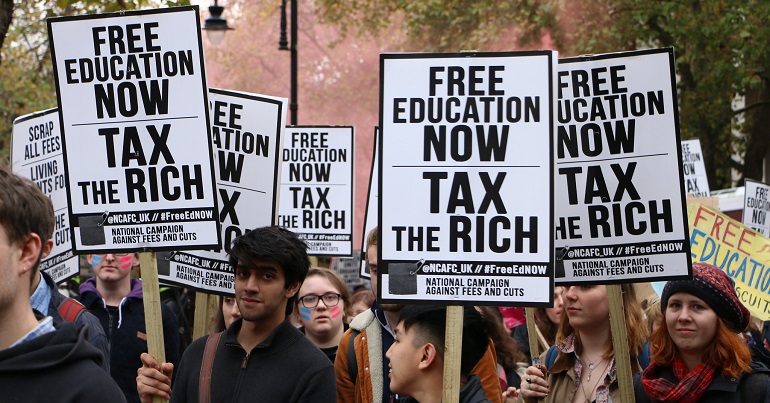Beyond Tuition Fees – Higher Education in a Post-Fees World

Politics is in a very different place than a few years ago. Radical change feels possible, tangible, close. The Labour Party’s pledge to scrap tuition fees is one of many signs of this – welcome, and necessary to salvage higher education from the marketised juggernaut it has become. But just abolishing fees is not enough to fix all of higher education’s problems.
The exploitation, the lack of democracy and the unequal representation in our universities all pre-date and extend beyond the headline-grabbing fee debate. Scrapping fees opens up a whole host of conversations and opportunities to tackle these issues, but only if progressive party members, campaigners, students, staff and wider society starts thinking about what campus life looks like beyond fees.
This also comes at a time of increasingly radical action on university campuses. At the time of writing we have just witnessed the largest strike action in the history of higher education over proposed cuts to lecturers’ pensions, with near-unprecedented levels of student-staff solidarity. This offers activists an incredible opportunity to start thinking about what campus life should be like, with engaged and energised staff and students ready to drive these conversations forward into tangible action.
Shifting the debt burden from individuals back to the state creates a number of challenges and opportunities, which this article series seeks to explore. Universities only pay lip service to the student experience, through muted, consumer-driven and off-focus approaches that are no replacement for proper democracy. There are better ways of ensuring the welfare of students (let alone staff) and democratising campus decision-making than treating students as consumers and dangling reputational and/or financial repercussions in front of senior management. We need to develop in detail what these alternatives look like and how we get there. How do we conceptualise students if not in the rhetoric of consumers, and how do we ensure they, along with staff, strengthen their voice within campus decision making?
This becomes all the more relevant when we take into account the challenges posed by the replacement funding option offered by Labour: publicly funded higher education. The Conservatives (with a little help from the Lib Dems) have set a precedent these past 8 years for incredibly invasive reforms within higher education. Reverting to complete government funding in this context leaves the independence and internal democracy of universities at risk. If public money is being used to fund these institutions, the public should surely have some say in what their focus and priorities should be, no? What, then, if the public disagrees with the students and staff in that university, or even all universities, over what campus operating and priorities should be?
And what about the host of other problems within higher education only indirectly linked to fees? What about the exploitation of postgraduate and early career researchers? The lack of diversity of those who actually get into university, let alone postgraduate study and beyond? The mental health crisis, the cost of living crisis and sexual harassment on campus? What role do our Students’ Unions, staff unions and NUS have to play in all of this, and in our idealised future visions of campus life? Scrapping fees is part of the solution to at least some of these issues, but only a part.
Perhaps underpinning all of these issues is a need for higher education to be refocused. What is the university for? Social mobility, employability, serving the ‘needs of the economy’, the passionate pursuit of knowledge, personal development or enjoyment, social justice, or all or none of the above? Government policy, senior management decisions and public rhetoric over recent years have attempted to craft higher education into a tool for the completion of all of these and more, but can the academy ever really do that?
The idea of “student experience” needs to be examined critically too. Is it meant to a be a (perhaps romanticised) idea of a lifestyle of study and play; of nights out and society meetings mixed with morning lectures and the occasional assignment deadline, something which is, in other words an experience which is “provided” or “delivered” by the University? Or is it something deeper, something more about utilising this time of learning to also learn how to direct one’s life, to learn how to take control of it and to participate in shaping the world around you? Before we decide where we’re going, we need to decide what it is we’re supposed to be.
This article series will hopefully at the very least begin to ask the right questions, and offer a few tentative steps towards the right answers. What campus life looks like in the post-fees world will be specific to each institution and the needs of those who organise within it, but we can hopefully begin to map out a general direction we need to be heading in, and a few practical steps that will help us get there, whether at the level of national policy or local campaigning.
Rarely has there been such an opportunity to transform higher education – let’s make sure we don’t waste it.
It is a time of extraordinary potential for change in UK Higher Education. Labour’s promise to end tuition fees has defied the critics and united many behind Corbyn’s political project. But what will the implications for universities be if this comes to pass? And what can we do to leverage this progress? In this new series, The Norwich Radical and Bright Green are bringing together perspectives from across the sector to explore these questions.
If you’d be interested in contributing to this article series jointly hosted by The Norwich Radical and Bright Green (posted on both sites), please contact either thenorwichradical@gmail.com or front-desk@project1-hvznj9e2s8.live-website.com with an article pitch!




You don’t seem to be aware that the Scottish Government abolished tuition fees for Scottish students 10 years ago, and that Education is devolved in Wales & N.Ireland too.
I expect a Green to understand that England is not the same as the UK
1.) Neither of the authors are Greens.
2.)The entire point of the series is that reform needs to extend beyond just scrapping fees on university campuses- so the fact that other countries in the UK have already done so is kind of irrelevant